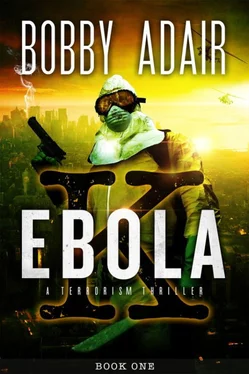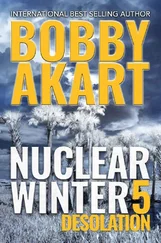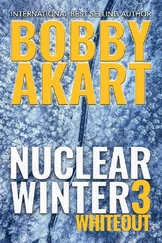“My apologies, Mr. Almasi.”
“I’ll leave it to you to select the specific financial instruments you sell. Your goals are to raise as much cash as possible and to convert that cash to gold and silver bullion that you will deliver to the appointed place by the appointed deadline.”
“As you wish.”
“I will call periodically for updates.” Najid hung up the phone.
In the next call, Najid bribed the right people to get two shiploads of food aid bound for East Africa redirected the relatively short distance to his father’s compound on the eastern shore of the Red Sea. Arms dealers were next on the list.
One woman in the back of the ward had been bleeding so severely through her nose for the last few hours that she no longer had the strength to hold the towel to her face.
Dr. Littlefield stood beside Austin in the center aisle watching. The woman in the next bed over had been groaning softly with what was presumably the last of her energy. She started to spasm, vomited black, and the bed around her pelvis turned red with her blood.
Dr. Littlefield didn’t move. But in a soft, clinical voice said to Austin, “The lining of her stomach died. Her body sloughed it off. That’s something you don’t normally see except in corpses that have been dead for a few days. That’s why it’s black.” Dr. Littlefield looked at Austin and his eyes were as hopeless as the people dying in row upon row of mats and beds. “Most of these people will die just like that, and there’s nothing we can do—not one goddamned thing.”
Austin looked around. Faces were slack as though people wore emotionless masks of themselves. When they weren’t vomiting and defecating clotted blood into their buckets and beds, they were bleeding out of their gums, ears, noses, and every other orifice. They stared at nothing—dolls or corpses with raspy breaths. Some cried. Most didn’t have the energy for that.
When the dying started, Dr. Littlefield had to press their captors to allow the bodies to be removed from the ward. After that, he and Austin were charged with the task of carrying them outside and stacking them beside the pit where Austin had been dumping waste buckets.
Najid’s men, still in their yellow Tyvek suits, kept their distance. A few held their places inside, a few in front of the hospital, a few out behind the building—all with weapons they apparently didn’t have any qualms about using.
The thing that struck Salim the oddest—as he sat in a contoured plastic airport chair, looking across an expanse of shiny terrazzo flooring in the Allama Iqbal International Airport in Lahore—was how much it looked like any airport in America. Only the clothes were different. Of course, some people wore Western clothes. Many wore what looked to Salim like pajamas.
Jalal sat in the chair beside Salim, looking out the tall windows at the airplanes, probably speculating about where they were going, what they’d be doing.
A hundred yards away, Salim was watching Zameer. Probably not his real name, but that’s how everyone referred to him in whispers. He didn’t know the man’s title or position and never asked. Those weren’t the kinds of questions to ask when one wanted to keep his head—literally. Salim did know—or suspect strongly—that the guy was in charge.
Salim had seen this man before. He had been through their small camp on three separate visits. Each time, the trainers were nervous and deferential. On one occasion, Zameer berated the trainers loudly, and with more than one slap and a kick to get his point across.
But now, Zameer—short-tempered as he was—stood nervously, shuffling his feet, checking the clock, looking around.
“Where do you think we’re going?” Jalal asked in a soft voice that was easily lost in the noise of the airport.
“Far away,” replied Salim.
Jalal looked at Salim, disappointment on his face. “We’re at an airport. We’re in the clothes we wore when we arrived. We have our passports. C’mon Salim, I don’t think that guess took a lot of effort.”
Salim scanned the terminal again. He was good with faces, and he knew he saw at least two others who had been in the van the day they all arrived in Lahore. Now they were all being sent somewhere internationally. The passports, returned to them with the rest of their possessions, assured that. “We’ll know when they give us our tickets.”
“We’ve been waiting for three hours.” Jalal’s impatience was starting to show.
“Does it matter how long we’ve been waiting?”
Jalal stood up. “I’m going to the loo.” Occasionally, his English dialect seemed out of place.
“I’ll be right here when you get back.” But as Jalal started to walk away, Salim reached up and caught his sleeve.
Jalal stopped and looked down at him, a question on his face.
Salim asked, “Have you seen any of the others here? I think I’ve seen a few.”
“Who?” Jalal asked.
“Some from the van, the day I arrived.”
Jalal looked around. “Good. We’re off to do something, I reckon.” Jalal spun and hurried off.
Salim went back to watching the formerly important Zameer wait on somebody more important. Salim started to wonder whether he’d see one of the familiar faces from the newscasts back in America—one of those high-profile terrorist targets. Now, there was a temptation. What if he did see such a man, with a two million dollar price tag on his head? Was his faith in jihad strong enough not to find a telephone and call in a tip? Was his hatred of America strong enough to keep him from doing it?
Being honest with himself, he didn’t know.
Two million dollars would put Salim in a different world. He wouldn’t be a powerless middle-class nobody anymore. Perhaps the world looked different when you were the one standing on the backs of the poor, rather than being stood upon. And that’s how Salim felt—stood upon, powerless, another of the faceless billions under the boot of America’s greed.
But to have America’s greed working for him as he sat on a beach, luxuriating in the dividends that two million dollars’ worth of that greed could provide—that might feel pretty good.
The powerful man shuffled some more, walked in a circle, checked his watch, and checked the clock on the wall again.
Jalal sighed as he walked up. “It’ll be good to go back to London.” He stretched. “I miss the fog.”
“You’re kidding, right?” Salim shook his head to emphasize his remark. “Fog?”
“No. I’m not kidding. I might be the only Englishman who likes it. I don’t know why. But I do.”
Salim asked, “How long did you live in London?”
“All my life.”
“And your parents?”
“From here. Both from Lahore,” answered Jalal.
“How come we never talked about this before?” Salim asked.
Jalal shrugged. “How come you never asked?”
“Such questions are discouraged,” Salim answered sadly.
“I know.” Jalal grinned. “When your CIA is waterboarding you, you can’t tell them what you don’t know.”
“Seems pointless now.” Salim looked for the important man. He seemed to have disappeared.
“How’s that?”
“Now that we’re off to go somewhere and actually do something. For all we know, we’ll be dead tomorrow.”
Jalal dropped back into the seat beside Salim, and exhaled a long, slow breath. The gravity of their choices had stopped being a romantic adventure. Youthful self-righteousness was turning into something with real consequences. Jokes about torture at the hands of the CIA might soon stop being funny.
Still unable to see the important man—unable to contain his curiosity, and definitely wanting to keep his options open on that two million dollars—Salim reached out, stretched his arms, and stood up in an attempt to get a better view down to the other end of the terminal.
Читать дальше












